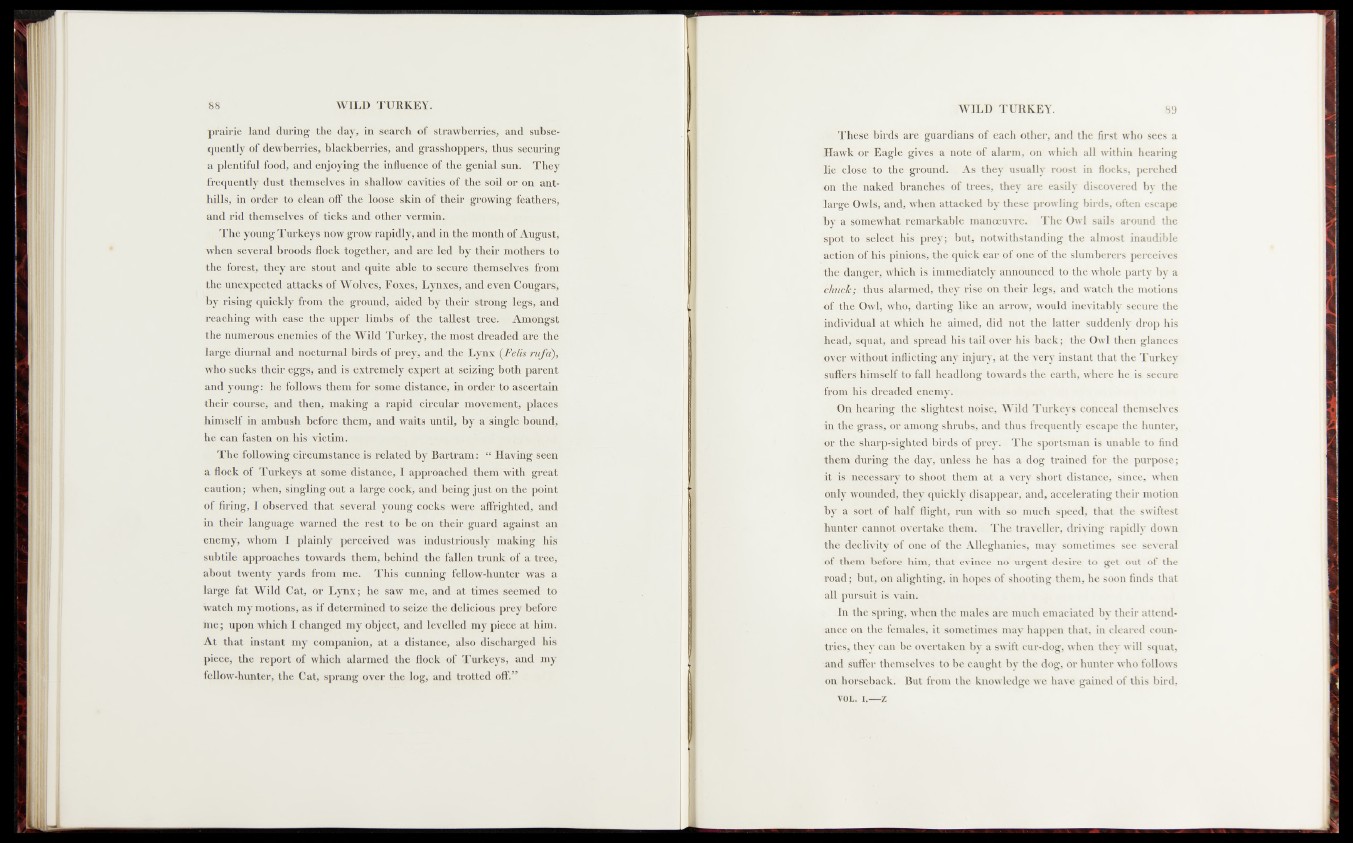
prairie land during the day,= in search of»t strawberries, and subse*
quently of dewberries, blackberries, and grasshoppers, thus securing
a plentiful food, and enjoying the influence of the genial sun. They
frequently dust themselves in shallow cavities of the soil or on anthills,
in order to cleamoff the loose skin of their growing, feathers,
and rid themselves of 'ticks- and pther vermin.
The young Turkeys now grow rapidly, and in the month of August,
when several broods flock together, and are led by their mothers to
the forest, they are/ ;stout and cpiite. ,âble, to-secure themselves from
the unexpected attacks of Wolves; Eokes, Lynxes, and even Cougars,
by rising quickly from the ground, aided by theiç.^ifrong. legs, and
reaching with easeÆhp jupper^limbs. of the tallest tree. >>,AnfongSt
the mjmerops enemies of the Wild T urkey,*theîmê’st dreaded are the
large diurnal and nocturnal birds of prey, and the r.\n \ (fk'rlh ru/aj,~
who sucks their eggs, and is extremely expert at seizing'both parent
and young: he follows them for some distance, in order tnascertain
their counse; and then, making a rapid circular movement, places
himself in ambush before them, and waits until, by a single bound,
he can fasten on his victim.
The following circumstance is. related by Bartram : “ Having sleep-
a flock of Turkeys at some distance, I approached them With great
caution ; when, singling out a large cock, and being just on the point
of firing, I observed that several young cooks-Were affrighted,, and
in their language warned the rest to be on their guard against an
enemy, whom I plainly perceived was industriously making hîüf
subtile approaches towards them, behind the fallen trunk of a tree,
about twenty yards from me. This cunning fellow-hunter was a
large fat Wild Cat, or Lynx; he saw me, and at times seemed to
Watch my motions, as if determined to seize the delicious prey before
me; upon which I changed my object, and levelled my pièce at him.
At that instant my companion, at a distance, also discharged his
piece, the report of which alarmed the flock of Turkeys, and my
fellow-hunter, the Cat, sprang over the log, and trotted off.”
These birds are guardians of each other, and the first who sees a
Hawk or Eagle gives a note of alarm, on which all within hearing
lie close to the ground. As they usually roost in flocks, perched
on the naked branches of trees, they are easily discovered by the
large Owls, and, when attacked by these prowling birds, often escape
by a somewhat remarkable manoeuvre. The Owl sails around the
spot to select his prey; but, notwithstanding the almost inaudible
action of his piaapas, the quick ear of one of the slumberers perceives
the danger,:which is immediately announced to the whole party by a
chuck; thus alarmed, they rise on their legs, and watch the motions
of the Owl, who, darting like an arrow, would inevitably secure the
individual at which he aimed, did not the latter suddenly drop his
head, squat, and spread his tail over his back; the Owl then glances
jover without inflicting any injury, at the very instant that the Turkey
suffers himsself tofall headlong towards the earth, where he is secure
from his dreaded enemy.
On hearing the slightest noise, Wild Turkeys conceal themselves
in the grass, or among shrubs, and thus frequently escape the hunter,
or the sharp-sighted birds of prey. The sportsman is unable to find
them during the day, phliss:be: has a dog trained for the purpose;
it i#:neeessary to shoot them at a very short distance, since, when
only wounded, they quickly disappear, and, accelerating their motion
by a sort óf half flight, run with so much speed, that the swiftest
hunter cannot overtake them. The traveller, driving rapidly down
the declivity of one of the Alleghanies, may sometimes see several
of them before him, that evince no urgent desire to get out of the
road; but, on alighting, in hopes of shooting them, he soon finds that
all pursuit is vain.
In the spring, when the males are much emaciated by their attendance
on the females, it sometimes may happen that, in cleared countries,
they can be overtaken by a swift cur-dog, when they will squat,
and suffer themselves to be caught by the dog, or hunter who follows
on horseback. But from the knowledge we have gained of this bird,
VOL. i.—z